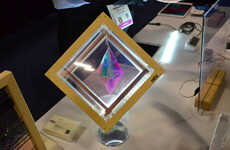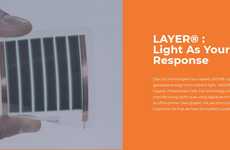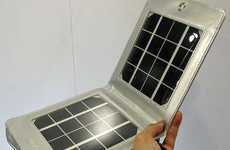
The Latest Japanese Breakthrough
TechnoGadget — June 14, 2008 — Tech
References: nextbigtrends
Sun is the best source of energy and power, but nature has always been better at harnessing the sun's energy.
The National Institute of Advanced Industrial Science and Technology (AIST), a Japanese Institute, Mitsubishi Corp. and Tokki Corp collaborated to create a plant-like solar cell module.
The design is a working prototype of a plastic plant equipped with organic thin film solar cells. These solar cells which are colored bright green are set in the leaves of the plant.
The design includes a plastic substrate, a phtalocyanine layer and a fullerene layer plus other materials with the ability to harness the power of the sun.
Each solar cell module is sealed with a very thin protective film to prevent the entry of water and oxygen.
The energy that can be generated from this plant can be used to power some appliances we have at home.
Presently, AIST is working on expanding the use of these organic thin-film solar cells in which they will be incorporated in architectural materials such as walls, windows, clothing materials, living wares, outdoor products and toys.
If this becomes successful, it would really be cool living in a house where every appliance runs by the power of the sun.
The National Institute of Advanced Industrial Science and Technology (AIST), a Japanese Institute, Mitsubishi Corp. and Tokki Corp collaborated to create a plant-like solar cell module.
The design is a working prototype of a plastic plant equipped with organic thin film solar cells. These solar cells which are colored bright green are set in the leaves of the plant.
The design includes a plastic substrate, a phtalocyanine layer and a fullerene layer plus other materials with the ability to harness the power of the sun.
Each solar cell module is sealed with a very thin protective film to prevent the entry of water and oxygen.
The energy that can be generated from this plant can be used to power some appliances we have at home.
Presently, AIST is working on expanding the use of these organic thin-film solar cells in which they will be incorporated in architectural materials such as walls, windows, clothing materials, living wares, outdoor products and toys.
If this becomes successful, it would really be cool living in a house where every appliance runs by the power of the sun.
Trend Themes
1. Plant-like Solar Cells - Opportunity to disrupt the solar panel industry by creating more organic, plant-like solar cells for use in architectural materials such as walls, windows, and clothing.
2. Organic Thin-film Solar Cells - Opportunity to disrupt the renewable energy industry by expanding the use of organic thin-film solar cells in outdoor products and toys.
3. Solar-powered Appliances - Opportunity to disrupt the home appliances industry by creating more solar-powered appliances using plant-like solar cell technology.
Industry Implications
1. Solar Panel - The solar panel industry can incorporate more organic and plant-like solar cell technology into their products to increase efficiency and appeal to environmentally conscious consumers.
2. Renewable Energy - The renewable energy industry can benefit from the expanded use of organic thin-film solar cells in outdoor products and toys, as well as in residential and commercial buildings.
3. Home Appliances - The home appliances industry can capitalize on the popularity of solar-powered products by incorporating more plant-like solar cell technology into their products.
1.7
Score
Popularity
Activity
Freshness























